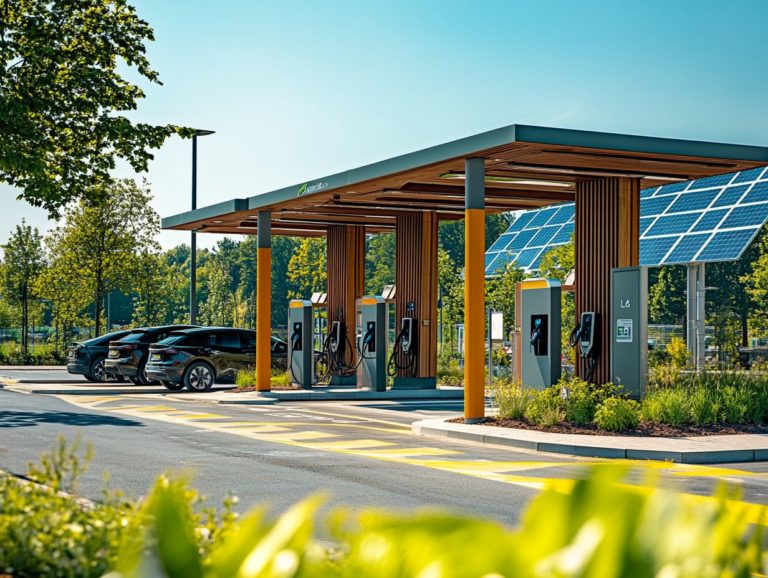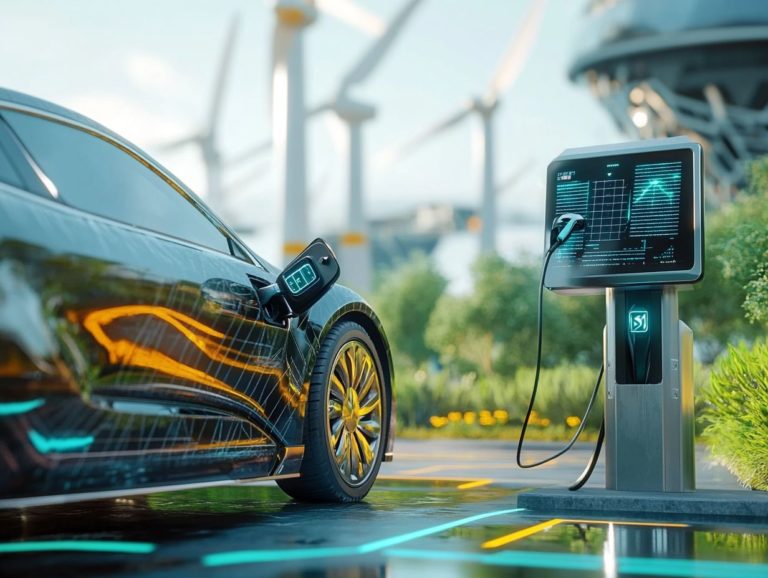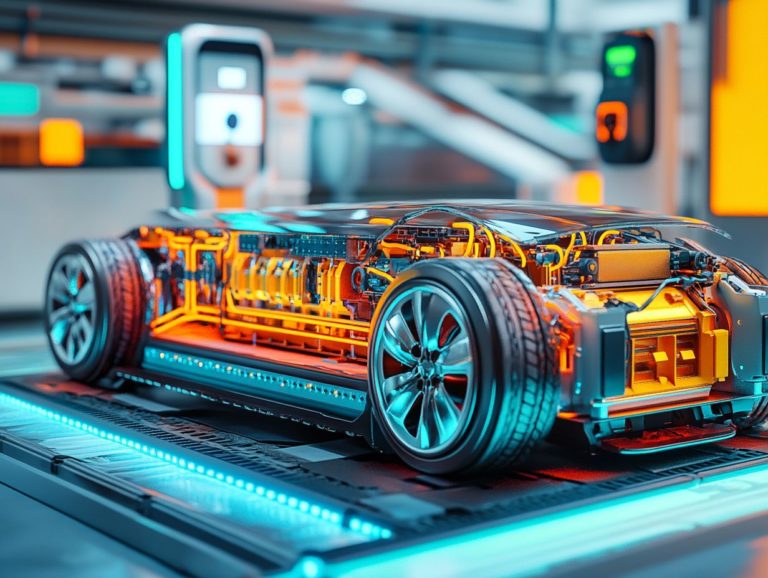The Role of AI in Smart EV Development
Electric vehicles (EVs) are not merely a passing trend. They signify a crucial transformation in your perspective on transportation and sustainability.
With the integration of cutting-edge technology, these vehicles are reshaping the automotive landscape in profound ways. This article delves into the intricate relationship between smart EVs and technological advancements, highlighting how innovations enhance features such as autonomous driving and predictive maintenance.
You will also encounter discussions on the challenges and ethical dilemmas that surface, alongside a glimpse into the thrilling future of this innovative sector.
Join us on this exciting journey as technology transforms the world of electric vehicles!
Contents
- Key Takeaways:
- The Role of AI in Smart EV Development
- AI Technologies Used in Smart EVs
- Challenges and Limitations of AI in Smart EV Development
- Future of Smart EVs with AI
- Frequently Asked Questions
- What is the role of AI in smart EV development?
- How does AI improve the performance of smart EVs?
- Can AI help in extending the driving range of smart EVs?
- What are some benefits of incorporating AI in smart EV development?
- What are the concerns or challenges with AI in smart EVs?
- How will AI’s role in smart EV development evolve?
Key Takeaways:

- AI is revolutionizing the automotive industry by enhancing the development of smart EVs, leading to increased efficiency, safety, and sustainability.
- AI technologies such as autonomous driving and predictive maintenance are crucial in the development of smart EVs, enabling seamless and optimized driving experiences.
- While AI has immense potential for smart EV development, addressing safety and ethical concerns will be crucial for its successful integration and widespread adoption in the future.
Why Electric Vehicles Matter Today
Electric vehicles (EVs) mark a transformative shift in the transportation landscape. They blend cutting-edge battery technology with innovative energy management systems to craft a cleaner, more efficient alternative to traditional vehicles.
As you navigate this evolving automotive industry, the benefits become increasingly clear, especially when it comes to reducing carbon footprints and enhancing local air quality.
With the integration of renewable energy sources, EVs are set to redefine the future of mobility while championing environmental sustainability.
Beyond their ecological advantages, electric vehicles present considerable cost savings for you. They lower fuel expenses and maintenance costs thanks to their fewer moving parts compared to internal combustion engines.
The growing network of charging infrastructure is pivotal in this transition, allowing you to recharge your vehicle conveniently at home, your workplace, or nearby public stations.
Advancements in battery technology not only extend driving ranges but also improve energy management. This ensures that your EV operates at peak performance with minimal waste.
As these elements come together, the advantages of switching to electric vehicles become strikingly clear, paving the way for a greener and more economically viable future for all.
The Role of AI in Smart EV Development
Artificial Intelligence (AI) is essential in shaping the future of smart electric vehicles. It significantly enhances both user experience and operational efficiency.
Through sophisticated computer systems that learn from data to improve performance and real-time data analysis, manufacturers are harnessing intelligent systems to optimize vehicle performance.
This includes improving safety features and ensuring energy efficiency, all of which make electric vehicles increasingly attractive to consumers.
How AI is Revolutionizing the Automotive Industry
AI is transforming the automotive industry with innovative solutions. It enhances self-driving features, improves traffic flow, and streamlines manufacturing processes!
Artificial intelligence is redefining safety with advanced driver-assistance systems (ADAS). These systems predict and respond to potential hazards, reducing accident risks and boosting driver confidence!
AI also optimizes your vehicle s efficiency with predictive maintenance and route planning. This helps cut down on fuel consumption and lowers emissions.
Your user experience is undergoing a remarkable transformation. Personalized in-car assistants enhance connectivity and convenience, tailoring infotainment systems to your individual preferences.
Together, these advancements are reshaping vehicles and laying the foundation for smarter cities and more sustainable transportation ecosystems.
AI Technologies Used in Smart EVs

In smart electric vehicles (EVs), a range of advanced AI technologies is utilized to elevate functionality and enhance user satisfaction. From predictive maintenance to energy management, these innovations work tirelessly to provide you with a seamless experience.
By harnessing machine learning and intelligent solutions, these technologies optimize your driving experience. They also enhance charging infrastructure and battery performance, ensuring you enjoy every ride to the fullest.
Autonomous Driving and Predictive Maintenance
Autonomous driving technology, driven by advanced AI algorithms, significantly enhances your vehicle’s efficiency and safety features. Predictive maintenance ensures that your car remains in optimal operating condition.
By utilizing the power of machine learning, your vehicle analyzes real-time data to anticipate and address potential issues before they arise. This transformative approach reduces the likelihood of accidents and optimizes fuel consumption, paving the way for a more sustainable future.
With smart sensors and interconnected systems, your electric vehicle (EV) adapts to various driving conditions. It makes informed decisions on the road!
The integration of predictive maintenance is crucial. It gives you the power to be proactive rather than reactive, allowing you to detect and mitigate issues like battery deterioration or tire wear early on. Together, these technologies contribute to a smoother driving experience and significantly lower operational costs, highlighting the vital role of smart EVs in the evolution of modern transportation.
Challenges and Limitations of AI in Smart EV Development
While the advantages of AI in smart electric vehicle (EV) development are plentiful, you must confront several challenges and limitations. Safety concerns, ethical dilemmas, and data privacy issues require your attention.
As this technology continues to advance, it’s essential to navigate these obstacles thoughtfully. This ensures the smooth integration of AI within the automotive industry while preserving consumer trust.
Addressing Safety and Ethical Concerns
Addressing safety and ethical concerns is paramount as you explore the world of AI and autonomous technology in smart electric vehicles. As the industry evolves at a breakneck pace, it s essential for you to establish guidelines and regulations that prioritize data privacy.
These regulations must ensure the safe deployment of advanced systems. In this context, existing frameworks like ISO 26262, a set of guidelines ensuring automotive safety, are critical for your success. However, there s an increasing demand for comprehensive regulations that guarantee technical safety while tackling ethical considerations, such as bias in AI algorithms and the transparency of decision-making processes.
By fostering a collaborative environment among manufacturers, policymakers, and stakeholders, you can help shape the development of smart vehicles. Incorporating best practices will enhance user trust and societal impact. Continuous improvement of these frameworks will significantly mitigate risks, paving the way for a safer and more ethically responsible future in electric mobility.
Future of Smart EVs with AI

The future of smart electric vehicles (EVs) is set to witness remarkable advancements. AI innovations will elevate the user experience and minimize environmental impact.
As you embrace these cutting-edge technologies, you’ll find that they enhance vehicle performance and transform mobility in ways you never imagined.
Potential Advancements and Impact on the Automotive Industry
Get ready! Smart EVs are connecting in new ways that will make a significant impact on the automotive industry. AI technologies are enhancing performance, safety, and user experience.
As these innovations become the norm, you will witness a remarkable transformation in the transportation landscape. Smart EVs are integrating autonomous driving capabilities, enabling vehicles to communicate with one another and with infrastructure.
This connectivity could lead to reduced traffic congestion and enhanced road safety, making your daily commute smoother and more secure.
Advancements in battery technology, combined with renewable energy sources, are allowing for longer ranges and faster charging times. This progress impacts consumers directly by making electric mobility increasingly attractive.
Vehicle-to-everything (V2X) communication is expected to further streamline urban transport, cultivating a more sustainable and efficient ecosystem.
This fusion of smart technology and electric mobility is reshaping your expectations now! It compels automakers to innovate continuously, redefining industry standards for the years to come.
Frequently Asked Questions
What is the role of AI in smart EV development?
The role of AI in smart EV development is to enhance the capabilities and efficiency of electric vehicles by using advanced algorithms and machine learning techniques. It enables vehicles to make data-driven decisions and learn from their surroundings in real-time, making them more intelligent and autonomous.
How does AI improve the performance of smart EVs?

AI improves the performance of smart EVs by analyzing data from various vehicle sensors and making adjustments to maximize efficiency. For example, AI can optimize battery usage, adjust acceleration and braking patterns, and even predict and avoid potential accidents.
Can AI help in extending the driving range of smart EVs?
Yes, AI can extend the driving range of smart EVs by analyzing driving patterns and optimizing energy usage. It can also use data from weather, traffic, and road conditions to determine the most efficient route for the vehicle, thereby reducing energy consumption.
What are some benefits of incorporating AI in smart EV development?
Incorporating AI in smart EV development offers improved safety and reduced emissions. It can lower operational costs and enhance communication between vehicles, creating smoother traffic flow.
What are the concerns or challenges with AI in smart EVs?
One major concern is the risk of cyber attacks and the protection of sensitive data. Ensuring the reliability of AI systems and addressing ethical issues with self-driving cars are also significant challenges.
How will AI’s role in smart EV development evolve?
AI is set to play a bigger role in the future of smart EV development. With technological advancements, we will see more sophisticated AI systems, paving the way for fully self-driving vehicles and smart charging solutions.






